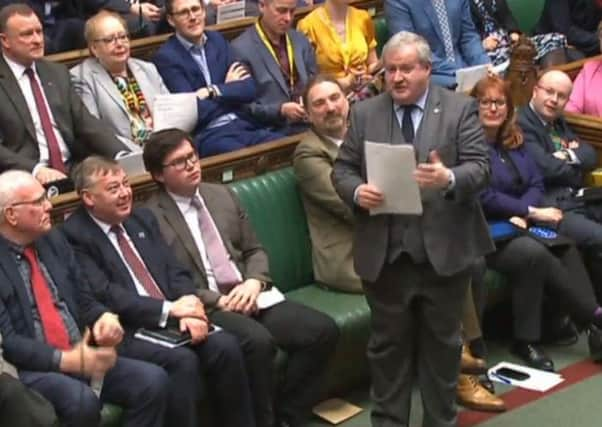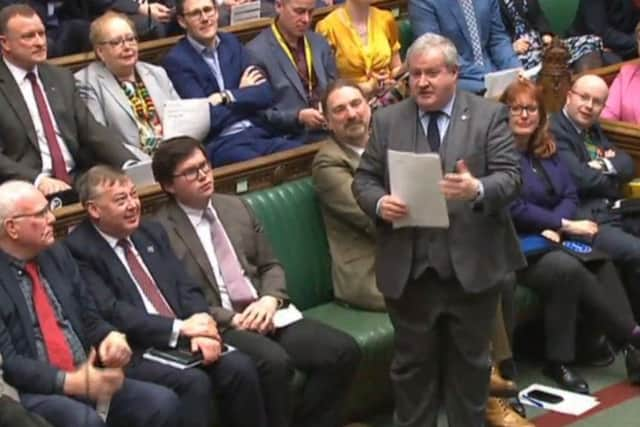Paris Gourtsoyannis: Scottish MPs being sidelined by their own parties


Being an MP is the best job in the world – right? We are often told how lucky parliamentarians feel, and rightly so. Campaigning for the issues they believe in and representing their communities is reward in itself. The pay and perks help. And yet.
It’s never been easy being a Scottish MP. You’re as far away from your family as any inmate of the open prison that is SW1A. Every inelegant spasm of devolution chips away at your role. Overlapping political and constitutional fault lines mean you can sometimes be viewed as a fifth columnist (even within your own party). It’s been several years since you’ve been able to check your social media alerts.
Advertisement
Hide AdAdvertisement
Hide AdScotland’s unpredictable politics mean there’s more than one MP who had a reasonable expectation of not being elected in 2017 who now finds themselves commuting to London on a weekly basis from the remotest corners of the country for a job they can’t quit. There are many more spending every spare moment furiously pounding pavements in their constituencies to shore up precariously slim majorities. It’s enough to give anyone the Sunday blues.


On top of all that, Scotland’s 59 MPs now find themselves being undermined by their own sides as they scrap for the square foot of territory marked ‘standing up for Scotland’.
In 2015, the SNP group at Westminster were revolutionary heroes. Today, they have to make do with being parliamentarians. Signs of listlessness at their reduced status are mounting.
With little appetite among the public or the SNP leadership for another independence referendum before the Holyrood elections, the nationalist group in the Commons has lost the edge that made them the centre of attention in the 2015-17 parliament, keeping morale high.


Many SNP MPs continue to work hard and have an impact in their portfolios or on individual issues, such Alison Thewliss’ campaign against the ‘rape clause’. However, the struggle to set the agenda and attract press coverage is reflected in a growing number of attention-seeking stunts: waving red cards and rude signs at the PM, or donning football tops in the chamber. Why, Pete Wishart has even become the voice of caution on the timing of indyref2.
Despite much chatter that a diehard from the left would emerge to challenge for the SNP deputy leadership, it is telling that there is no Westminster interest in the contest.
The disinterest is mutual. Even before the Cambridge Analytica controversy sucked in the SNP, there were grumbles about the level of engagement from Edinburgh. When there were 56 nationalists at Westminster, Nicola Sturgeon promised she would attend group meetings regularly; her appearances have been rarer than some MPs would like.
The fact that Westminster leader Ian Blackford was allowed to stand up at PMQs and condemn the Tories’ links to Cambridge Analytica without knowing an SNP contractor had met the company is bad enough. The fact he reportedly remained in the dark for hours after the news slipped out during a committee hearing, despite calls to SNP HQ, lays bare a worrying lack of coordination. (NB: while SNP internal politics are worthy of note, the nationalists are by no means at the heart of the Cambridge Analytica story. There is plenty of excellent reporting to help anyone confused on this point.)
Advertisement
Hide AdAdvertisement
Hide AdScottish Conservatives arrived at Westminster under the weight of 20 years’ of history, to which Ruth Davidson added a considerable burden by promising they would act as a bloc and hold the government to account on behalf of Scotland.
It raised unreasonable expectations that Davidson’s 12 backbench MPs could exploit parliamentary arithmetic and tweak the Brexit process in Scotland’s favour. Disappointment has been swift and crushing. On post-Brexit powers and fishing, MPs themselves have learned that, disarmed of any serious threat of rebellion, their influence ranks behind the ‘Mutineer’ triumvirate of Anna Soubry, Dominic Grieve and Ken Clarke, let alone the 10-strong DUP group.
Davidson, meanwhile, has discovered that some of her MPs have little interest in advancing their leader’s agenda. Several have decided their careers and local branch meetings will go more smoothly if they mimic the prevailing Brexit enthusiasm on the Tory benches. Anger displayed by Scottish Tories over the UK Government’s Brexit ‘power grab’ has evaporated; indeed, it’s clear from private conversations that one or two of the MPs has more traditional views about the scope of devolution than you might expect.
On the Labour benches, it’s difficult for the seven Scottish MPs to speak with one voice when six of them owe their jobs to Jeremy Corbyn, while the seventh and most senior remains frozen out by the Labour leader. All arrived with one goal in common, though: pushing forward the agenda championed by Gordon Brown and Kezia Dugdale for a constitutional convention and a federal UK.
However, despite appearing in the 2017 manifesto, constitutional reform has been ignored. Responsibility for that portfolio gathers dust in the in tray of Corbyn ally Jon Trickett, who Scottish MPs dismiss as “useless”.
Even the Scottish Lib Dems — who make up a third of their party’s number at Westminster and are odds-on to provide the next leader — have reasons not to be cheerful. Their unique selling point is a referendum on the terms of the UK’s Brexit deal, which in any normal person’s vocabulary is a second EU referendum. Scottish Lib Dems are wary of going on the doorstep offering second referendums.
The common thread through all of these circumstances is the challenge posed by the growing expectation that Scottish MPs will serve a distinct set of interests from their UK colleagues. MPs may conclude that managing those expectations is a more achievable goal that meeting them.
